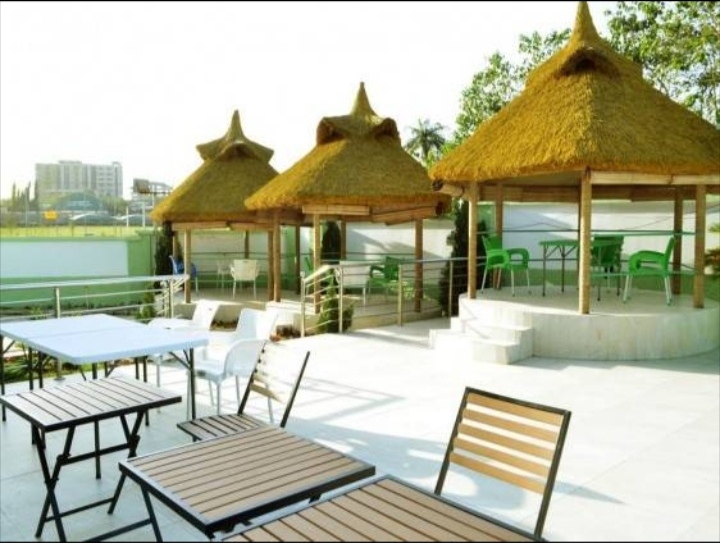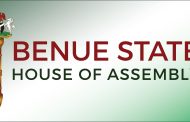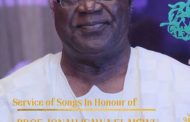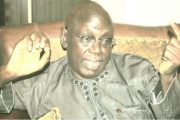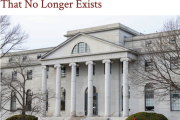He doesn’t make the headlines yet but he is a good example of an indigenous expert with global competitiveness. We are referring to Mr. Omale Ben Amedu, the Chief Executive of MB Amedu & Associates, an environmental development outfit. An interview became inevitable a few minutes of the conversation with him as the experientially based insights and patriotic codes of practice he articulates are certainly not common place stuff.

Ben Amedu, a rising Nigerian tourism technocrat
The story of how he came about all of that masterful confidence is a long one. A good starting point of that story might be when he joined Jardini Development & Associates, Spanish owned landscaping and environmental development outfit. That was in 1991 after so many years in Kano. Kano wasn’t bad for him but it was not anything compared to Abuja. The time he was in Jardini was when the company got high profile jobs in the domain such as the Hilltop in Minna, a property in Takum, a major house in Kano, initial expansion and beautification of the Abuja City Gate and planting of trees up to the Presidential Wing of the Nnamdi Azikiwe Airport, Abuja. That company also set up the plant nursery for the FCDA, handled initial landscaping for what is now known as Transcorp Hotel and partook in putting up a part of the MKO Abiola Stadium sublet to it by Julius Berger. It was a period of good exposure and lesson learning from professional involvement in the design and delivery of these high profile jobs.
But it was also the time for hopping back for further education at the Usman Dan Fodio University, Sokoto from where he did not return to Jardini but went on to Mallorca Limited. Interestingly, Mallorca is another Spanish landscaping or tourist outfit, named after a Spanish town. That was where he found himself from 1997 till he set up his own landscaping and environmental development outfit as named above. It was in 2006.
The first job he handled was setting up the New Zaria Township Stadium, a Type A FIFA Standard football pitch. According to Mr. Amedu, what is unique about that is how it, arguably, makes him the first Nigerian to set up FIFA Standard Football pitch without expatriate involvement. All others, he says, had expatriate involvement. It means that unless his claim is successfully challenged, he broke a record in setting up that 105m by 75m facility all by a Nigerian crew.
The first time he would say he was involved in record breaking was when, while with Mallorca, he handled the reworking of five national stadia in each of Lagos, Ibadan, Kaduna, Enugu and Bauchi. The great point in this is that it was done simultaneously, not one after another. It was his last assignment in Mallorca.
Amedu was asked if the state of the economy is not affecting the tourism industry of which landscaping and environmental development is a part. Landscaping and environmental development is one part of it just as there are also the catering and hospitality aspect and the third one which is transportation. His answer is that it does, mainly in terms of compelling people to accept gardeners for landscapers. But the two, he says, are not the same. In other words, what the economic crisis does to this business area is to imperil it because when a landscaper follows through with the concept he has developed, the client will be satisfied and the public will be happy. His argument is that, with the landscaper, the job will not just be to plant trees. It will go beyond the beauty aspect to incorporate the economic and the developmental. Of course, he is not unmindful of how people like him could be in the cold when the economy is not booming.
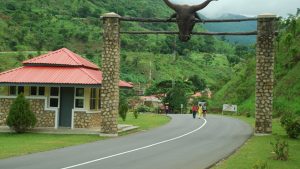
Entrance to Obudu Cattle Ranch, one of Nigeria’s signature tourist attractions
But he sees a paradox in the situation. He locates the paradox in how tourism is, in his view, the industry that can reverse the misfortune of the Nigerian economy in a way nothing else can. That argument goes like this: culture is the only thing that is unique in life. A culture may be similar to another culture but two cultures are rarely the same. Since revenue in tourism depends on outsiders who want to come and experience a cultural touch of what you have to show, it means you can boost the economy when you develop your cultural tourism”. He illustrates his argument with three Nigerian states: Cross Rivers, Akwa Ibom and Rivers which he says have taken the lead. “That sector is yielding returns. These three states are harnessing returns. At the end of every year, especially in Calabar, they have their carnival which takes a whole month in December”.
Amedu thinks they can climb higher if they were to infuse a more business sense into it beyond the carnival sense although he is excited by the version that takes place in Rivers State, for example, saying that the returns would be huge if the traditional festivals are harnessed. Stretching the claim that tourism can do much, the tourism technocrat explains how Nigeria has already lost out in the realm of academic tourism. Instead of others coming to Nigeria to study, it is Nigerians who go out in large numbers to study. “We can reverse what we have lost there if we develop our cultural tourism”, he insists, pointing out how his passion to in being involved in setting up a tourism development master plan for each state of the federation and even down to the local governments. “Any government that can make use of us and by which I mean professionals, we would do it, we would be happy and the society would be happy”, he argues.
How would the society be happy, he was asked. The answer comes like this: tourism is the future, it is the business, it is the economy of the future and the future is today”. To that enigmatic claim, he adds how beneficial it would be in terms of harnessing talents, keeping the youths engaged, encouraging competitive spirit and diverting attention to cultural creativity from the local to the national level”. Besides, developing the master plan comes along with other elements such as appropriate technology and their utilization as well as an active market that cultural and tourist centres turn into.
Intervention wanted to know what would be the problems in making his plan happen. “For this country, it is insecurity because tourism involves movement of the people, sometimes from one extreme part of the world to another. And, in movement, human lives are involved. That makes security the first constraint. I wouldn’t consider finance the first problem there”. He also thinks accommodation could become a snag, depending on how the plan is worked out and operationalised.
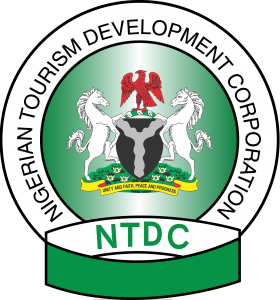 However, Amedu would dismiss any fears of success provided Nigeria privileges using indigenous tourism technocrats “because we know who we are, where we are”. He doesn’t accept he is arguing for autarky or is unmindful of globalisation. He actually hits back by saying that globalisation is not practiced only in Nigeria, insisting that what he is saying is what is done elsewhere. He, therefore, doesn’t see any contradiction in the main point of his argument which is this: I want to make a statement that, from design to execution, no expatriate in this country can beat us. I have worked more with expatriates than Nigerians and I can say this”.
However, Amedu would dismiss any fears of success provided Nigeria privileges using indigenous tourism technocrats “because we know who we are, where we are”. He doesn’t accept he is arguing for autarky or is unmindful of globalisation. He actually hits back by saying that globalisation is not practiced only in Nigeria, insisting that what he is saying is what is done elsewhere. He, therefore, doesn’t see any contradiction in the main point of his argument which is this: I want to make a statement that, from design to execution, no expatriate in this country can beat us. I have worked more with expatriates than Nigerians and I can say this”.
He is not canvassing for exclusion of expatriates but drawing attention to what he calls a transformation that has taken place. The transformation is that “Nigeria now has core people who can develop any tourism facility from A – Z”, something that wasn’t the case before and hence the imperative for rethinking patronage pattern now. That is, patronage must be shared or extended to both indigenous and expatriates. This, he says, requires deliberate prioritising. It is both an argument and an appeal to the government which has the bulk of the national economy.
How does he compete in this environment? He answers by saying that, as a professional, he relies on merit and quality. He doesn’t do otherwise. The moral ideology he works with is that which says that the food that belongs to the toad will not be found on a tree top. He explains why he finds the logic fascinating. The toad has no capacity to climb a tree top. Struggling for any food that is found on top of the tree is therefore fruitless without the toad doing anything unnatural. For that reason, Amedu sticks to his moral outlook, denying that it is the lasting effect of the dosages of moral revivalism inhaled from his Catholic owned Alma mater – Emmanuel Secondary School, Ugbokolo. Rather, he traces it to “my orientation from the beginning. The people I worked with, that is what they told me. So what mostly happens is that, from our works, somebody must mention me to somebody and they will call me. So, our past, our footprints, the works we have done gives us more jobs and I am okay with that. I don’t have to do any extra struggle to get anything”.
This posture might have served him well but has once rubbed him wrongly too. Once he did a job – establishing a football pitch at Murtala Square in Kaduna for Nalado Nigeria Limited. But he got a raw deal, according to his story. “I lost 10 million Naira till today. I was denied the payment”. He didn’t just take it lying low. He wrote petitions right up to President Goodluck Jonathan but nothing came out of it. There is a sense of pain in his narrative of this dark spot in his career progression. He has not given up but he has given the assignment to God.

